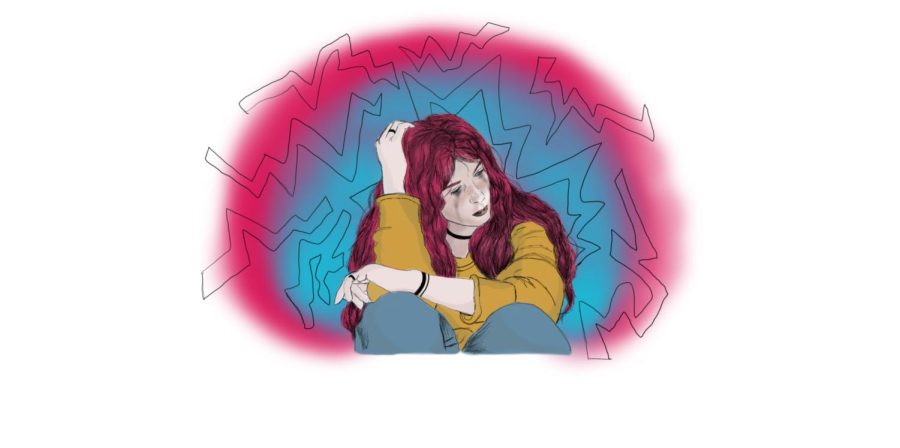‘I Hear You’: Sexual Assault Awareness Month 2022 Addresses Year-Round Cause
(Design by Storey McDonald | The Daily Utah Chronicle)
May 4, 2022
This story contains discussions of interpersonal violence.
On Jan. 26, 2022, University of Utah students were notified of a reported sexual assault that occurred at the Kappa Sigma fraternity house in September 2021. Just five days later, another notice was sent out to students: an anonymous student reported they had been sexually assaulted at a different fraternity house in December.
On Feb. 11, a 19-year-old international U student was killed in a domestic-violence related homicide.
In the United States, 81% of women and 43% of men reported experiencing some form of sexual harassment or assault in their lifetime, according to the National Sexual Violence Resource Center. The same source reports about “one in four undergraduate women experienced sexual assault or misconduct at 33 of the nation’s major universities.”
It’s On Us, the nation’s largest nonprofit program targeted at preventing college sexual assault and supporting survivors, found women of ages 18-24 three times as likely as other women to experience sexual assault. Additionally, It’s On Us reports that “more than 40% of college students who were sexually victimized also reported experiences of institutional betrayal.”
According to Kristy Bartley, the counseling coordinator for the Women’s Resource Center, sexual violence has a negative impact on a student’s educational experience — survivors can become afraid of running into their assaulter on campus, sometimes causing them to miss class or isolate themselves from friend groups.
Trauma can take a toll on a survivor’s overall wellness such as how they eat or sleep, explained Jenna Templeton, the assistant director of Health Education at the Center for Student Wellness.
“Poor nutrition and lack of rest can impact their ability to show up fully in the classroom — how they learn, remember, focus and communicate — which can lead to impacted performance on assignments and projects,” Templeton said in an email interview.
Survivor Resources
There are many resources available for students who experience sexual assault and domestic violence.
According to Lauren Weitzman, the director of the University Counseling Center, students can access individual and group counseling through the UCC on campus.
The UCC also hosts the Mindfulness Center, which provides guided meditations and practices on their website.
Crisis services are also available when immediate care is needed. During fall and spring semesters, students can speak with a crisis counselor by calling or visiting the UCC during business hours.
If care is needed after hours, students can call or chat through SafeUT, an app that can provide emotional support and crisis intervention on a variety of counseling topics, including depression, grief and bullying. For students living on campus, the Mental Health First Responders team is available, which can provide free services such as assessment, stabilization and diversion, among others.
At the WRC, individual counseling is available for all genders as well as support groups for women, with two groups specifically for women of color, explained Bartley.
While these groups are not specifically focused on sexual assault or similar topics, these issues are often discussed, according to Bartley.
The CSW offers three main programs, said Templeton — prevention and education, victim-survivor advocacy and Recovery at the U.
According to the CSW’s assistant director of advocacy and victim-survivor advocate herself, Ellie Goldberg, victim-survivor advocacy helps students, faculty and staff who have experienced any type of relationship or sexual violence, stalking, sexual harassment, family violence and even trafficking.
“What we do is we meet with our clients to kind of figure out how their experience, how the trauma that they’ve experienced is impacting them in different areas of their life and their wellness,” Goldberg said.
Victim-survivor advocacy will help their clients navigate the healing process and assist them in accessing whatever resources they need. Additionally, if clients want to report to the police or Title IX, they will receive assistance throughout that process.
During April, the CSW will run a campaign for Sexual Assault Awareness Month. The theme is “I Hear You,” and it focuses on encouraging the campus community to reflect on how to provide space for survivors to feel comfortable asking for help, and to think about what that support looks like.
The CSW hopes the awareness raised during April will not be contained to one month, but rather increase throughout the year and heighten advocacy among the U community.
“We recognize and emphasize the importance of listening to and believing survivors, while providing resources that exist both on and off campus,” Templeton said.
When getting survivors help, Weitzman said it is important to give them the power to choose what they want to do for their own healing process.
“[Making decisions] is an important part of the healing process, because, obviously, the experience of sexual assault takes that away,” she said.
Stopping the Stigma
“Survivors often do not come forward to share their experience or report in a formal way because they fear they won’t be believed,” Templeton said.
Believing and listening to survivors is the first step, especially if someone is telling another person out of trust, Goldberg emphasized.
“It’s really tough,” she said. “Oftentimes there’s a lot of just like shame or fear around disclosing that something has happened to you.”
Another reason survivors may not come forward is the victim-blaming language and ideologies ingrained in modern culture. An impactful way to change this culture is to hold the ones responsible for the violence accountable, urged Templeton.
“Instead of questioning a survivor’s behavior, dress, sobriety, etc., we can focus our energy on holding perpetrators accountable for their actions, providing education to keep perpetrators from harming again and challenging victim-blaming ideology,” she said.
In addition to believing survivors, people can also ask how to support them, explained Bartley. This can be done through things like letting a victim know about the services available to them or offering to walk with them to the counseling center.
Goldberg said when responding to someone who has come forward about a sexual assault or similar experience, one thing to avoid is asking more questions than necessary.
“It’s okay to ask if they’re safe, but there’s no need for you to ask for more details about their experience, and that might be really traumatizing,” she said.
Another thing not to do is take action without the victim’s consent such as reporting without their knowledge. The only exception would be mandatory reporters at the U such as faculty, non-mental health administration and staff and resident advisors, to name a few. Clinical staff at the UCC and WRC as well as victim-survivor advocates like Goldberg are not mandatory reporters and are confidential.
“I think the important thing is that we all respond, right?” she said. “We respond when people are injured, and when harm has been done.”
Goldberg encouraged the campus community to get involved in the sexual assault awareness campaign happening during SAAM. She said there will be events around community building, raising awareness and prevention.
“There’s just tons of different ways to get involved and a big part of that is just community building and showing survivors on our campus that we care and that we’re here for them,” Goldberg said.
Educational information on prevention can be found through the McCluskey Center for Violence Prevention, which provides educational resources for the U community.
Taking Action
After receiving two sexual assault reports that happened in two different fraternity houses, Jess Turuc, the director of fraternity and sorority life, said they put a two-week pause on Greek life activities to have conversations on better addressing these issues.
Turuc shared they conducted a “collective community survey” to understand what is happening with party culture and some of its norms to gain a better understanding of these issues.
Additionally, Greek life worked with campus partners to develop targeted programming and different initiatives to help the community better understand how to report and move forward in a productive way.
Turuc shared they have worked with the CSW and the MCVP in hosting workshops and speakers and having dialogues on various topics like alcohol and party culture.
“Our main prevention piece is just education,” she said. “How do we help folks understand the resources that are here on campus, as well as [in] the local community?”
ASUU President-elect Taylor VanderToolen said the incoming ASUU presidency wants “to be able to imagine the best ways … that we can improve safety on campus.”
As part of their efforts to promote safety on campus, VanderToolen said they have talked with Chief Safety Officer Keith Squires to potentially create a student advisory committee and set up monthly meetings with ASUU. This would be for the purpose of helping campus police better understand student concerns and attitudes regarding campus policing and safety, he said.
Additionally, VanderToolen said he wants to see more transparency with campus crime data and making the data more accessible to students.
He added ASUU is seeking to be advocates for students and help represent students in the best way possible and that includes advocating for campus safety.
To get involved in campus events for SAAM, students should visit the CSW’s website.









